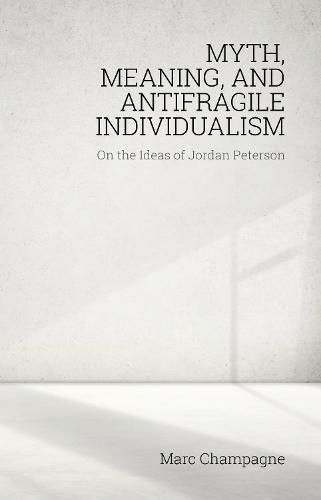Readings Newsletter
Become a Readings Member to make your shopping experience even easier.
Sign in or sign up for free!
You’re not far away from qualifying for FREE standard shipping within Australia
You’ve qualified for FREE standard shipping within Australia
The cart is loading…






This title is printed to order. This book may have been self-published. If so, we cannot guarantee the quality of the content. In the main most books will have gone through the editing process however some may not. We therefore suggest that you be aware of this before ordering this book. If in doubt check either the author or publisher’s details as we are unable to accept any returns unless they are faulty. Please contact us if you have any questions.
Jordan Peterson has attracted a high level of attention. Controversies may bring people into contact with Peterson’s work, but ideas are arguably what keep them there. Focusing on those ideas, this book explores Peterson’s answers to perennial questions.
What is common to all humans, regardless of their background? Is complete knowledge ever possible? What would constitute a meaningful life? Why have humans evolved the capacity for intelligence? Should one treat others as individuals or as members of a group? Is a single person powerless in the face of evil? What is the relation between speech, thought, and action? Why have religious myths and narratives figured so prominently in human history? Are the hierarchies we find in society good or bad?
After devoting a chapter to each of these questions, Champagne unites the different strands of Peterson’s thinking in a handy summary. Champagne then spends the remaining third of the book articulating his main critical concerns. He argues that while building on tradition is inevitable and indeed desirable, Peterson’s individualist project is hindered by the non-revisable character and self-sacrificial content of religious belief.
This engaging multidisciplinary study is ideal for those who know little about Peterson’s views, or for those who are familiar but want to see more clearly how Peterson’s views hang together. The debates spearheaded by Peterson are in full swing, so Myth, Meaning, and Antifragile Individualism should become a reference point for any serious engagement with Peterson’s ideas.
$9.00 standard shipping within Australia
FREE standard shipping within Australia for orders over $100.00
Express & International shipping calculated at checkout
This title is printed to order. This book may have been self-published. If so, we cannot guarantee the quality of the content. In the main most books will have gone through the editing process however some may not. We therefore suggest that you be aware of this before ordering this book. If in doubt check either the author or publisher’s details as we are unable to accept any returns unless they are faulty. Please contact us if you have any questions.
Jordan Peterson has attracted a high level of attention. Controversies may bring people into contact with Peterson’s work, but ideas are arguably what keep them there. Focusing on those ideas, this book explores Peterson’s answers to perennial questions.
What is common to all humans, regardless of their background? Is complete knowledge ever possible? What would constitute a meaningful life? Why have humans evolved the capacity for intelligence? Should one treat others as individuals or as members of a group? Is a single person powerless in the face of evil? What is the relation between speech, thought, and action? Why have religious myths and narratives figured so prominently in human history? Are the hierarchies we find in society good or bad?
After devoting a chapter to each of these questions, Champagne unites the different strands of Peterson’s thinking in a handy summary. Champagne then spends the remaining third of the book articulating his main critical concerns. He argues that while building on tradition is inevitable and indeed desirable, Peterson’s individualist project is hindered by the non-revisable character and self-sacrificial content of religious belief.
This engaging multidisciplinary study is ideal for those who know little about Peterson’s views, or for those who are familiar but want to see more clearly how Peterson’s views hang together. The debates spearheaded by Peterson are in full swing, so Myth, Meaning, and Antifragile Individualism should become a reference point for any serious engagement with Peterson’s ideas.